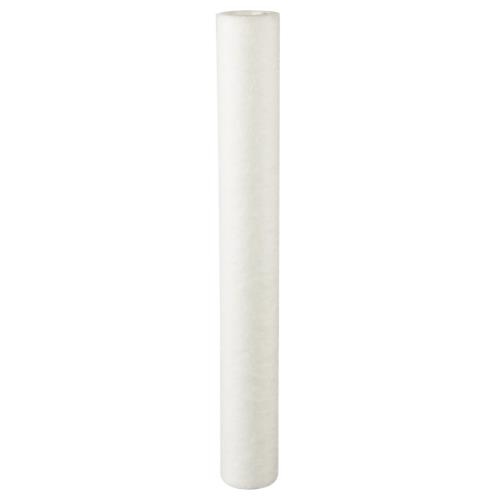Hydro-Logic
Hydro-Logic Tall Boy Sediment Filter - Poly Spun
Hydro-Logic Tall Boy Sediment Filter - Poly Spun
20 in stock
Couldn't load pickup availability
Payment options
- Fast Delivery
- Easy Returns
- Secure Checkout
Description
Description
Hydro-Logic Tall Boy Sediment Filter - Poly Spun
Removes up to 99% of chlorine, 90% of sediment, rust, silt, etc., and volatile organic compounds and particulates down to 5 microns @ 2 GPM. Easily produces 120 gallons per hour of clear water and has a filter capacity of 7,500 gallons. Great as a high-capacity pre-filter for Stealth RO™ units. Includes: 2-stage 20 in filter unit, wall mountable metal bracket, female garden hose connector, brass male garden hose connector, 4 ft feed line, 4ft outlet line, filter wrench, and instructions.
Unit size is 12 in x 25.5 in x 6 in and weight is 12.6 lb.
Pre Filter
HGC741658 Hydro-Logic Tall Boy Sediment Filter - Poly Spun
Carbon Filter
HGC741656 Hydro-Logic Tall Boy Green Coconut Carbon Filter
HGC741624 Hydro-Logic Tall Boy KDF85/Catalytic Carbon Upgrade Filter
HGC741668 Hydro-Logic ChloraShield TALLBoy Replaceable Upgraded filter (20/cs)
Accessories
HGC728914 Hydro-Logic Float Valve QC 3/8 in for Evolution RO 1000 and Tall Boy
Share

INFORMATION QUESTIONS
FREQUENTLY ASKED QUESTIONS
What is Hydroponics?
Hydroponics is the science of growing plants without soil. The plants thrive on the nutrient-water solution alone. The growing medium merely acts as a support for the plants and their root systems while the solution passes freely. The growing medium, if any, is totally inert.
What types of plants grow best hydroponically?
Anything can be grown hydroponically, but some plants prove to be more space efficient. Some plants we suggest are tomatoes, sweet peppers, hot chilies, lettuce, spinach, squash, cucumbers, broccoli, beans, snow peas, herbs and flowers of all types.
Can you REALLY get better yields/quicker growth?
Absolutely. The plants, when receiving everything they need, tend to be healthier, faster growing and generally more productive. You can expect 30% faster growth with many crops.
What are the watering cycle timelines hydroponic systems?
Once the reservoir is filled with nutrients, it is time to put your hydro system to work! The ease of hydroponics is automation – automation is achieved by putting the pump on a timer according to your watering needs. The watering cycle depends on growth stage, growing medium and hydroponic system. In an ebb and flow or drip system with rockwool as the medium, seedlings, clones and plants in the early vegetative stage require watering only once a day for 15-30 minutes (twice a day for higher temps). Mature, flowering and fruiting plants require a heavier feed and can be fed once a day for 30 minutes (twice a day for higher temps). Typically soiless mixes and coco fiber can be watered for about 15 minutes twice a day, and can be adjusted for heavier feeding during the flowering and fruiting stage or higher temps. ViaStone, Hydroton, Grow Rocks, and Silicate mediums need to be watered more frequently – a constant drip for drip systems, and about 15-30 minutes every 3 hours for ebb and flow systems and can be adjusted for heavier feeding during the flowering and fruiting stage or higher temps. Aeroponic systems require frequent watering cycles; 30-60 seconds every few minutes or a constant spray.
What do I need to test pH? How do I test pH?
pH has a range from 0 (acidic) – 14 (alkaline), with 7 being neutral. A proper hydroponic pH range is between 5.5 to 6.2 for most hydroponic crops. For specific crop pH, check out our Plant Guide. pH must remain within the proper range for good plant health, disease resistance, and proper nutrient uptake. pH is maintained by adding pH Up and pH Down to the nutrient solution. For more information, see the Testssection of our site.
How will the flavor compare to my outdoor grown, organic produce?
The taste may be even better! This is simply due to the fact that the hydroponically grown plants are getting everything they need, when they need it. Don’t be fooled by “hot house” produce grown commercially. The grower’s primary concern is shipability and storage, not flavor. When you grow your own vegetables at home, you can expect nothing less than excellent results. Plus, hydroponically grown produce has the added benefit of a longer shelf life.

